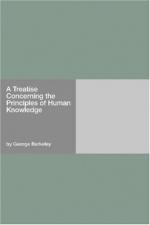10. Two objections to the existence of abstract ideas.—Whether others have this wonderful faculty of abstracting their ideas, they best can tell: for myself, I find indeed I have a faculty of imagining, or representing to myself, the ideas of those particular things I have perceived, and of variously compounding and dividing them. I can imagine a man with two heads, or the upper parts of a man joined to the body of a horse. I can consider the hand, the eye, the nose, each by itself abstracted or separated from the rest of the body. But then whatever hand or eye I imagine, it must have some particular shape and colour. Likewise the idea of man that I frame to myself must be either of a white, or a black, or a tawny, a straight, or a crooked, a tall, or a low, or a middle-sized man. I cannot by any effort of thought conceive the abstract idea above described. And it is equally impossible for me to form the abstract idea of motion distinct from the body moving, and which is neither swift nor slow, curvilinear nor rectilinear; and the like may be said of all other abstract general ideas whatsoever. To be plain, I own myself able to abstract in one sense, as when I consider some particular parts or qualities separated from others, with which, though they are united in some object, yet it is possible they may really exist without them. But I deny that I can abstract from one another, or conceive separately, those qualities which it is impossible should exist so separated; or that I can frame a general notion, by abstracting from particulars in the manner aforesaid—which last are the two proper acceptations of abstraction. And there are grounds to think most men will acknowledge themselves to be in my case. The generality of men which are simple and illiterate never pretend to abstract notions. It is said they are difficult and not to be attained without pains and study; we may therefore reasonably conclude that, if such there be, they are confined only to the learned.




